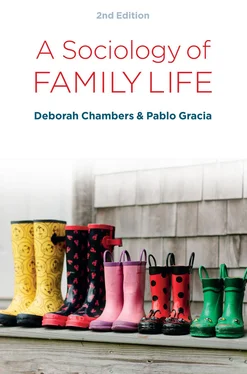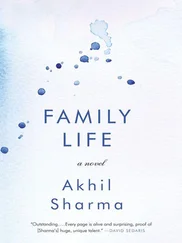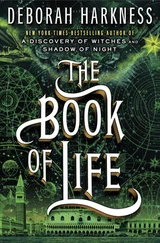By exploring a further means by which government policies impact on families’ fertility decisions, chapter 8addresses the impact of new reproductive technologies in a number of societies and among particular ethnic groups. The chapter summarizes controversies about the moral dilemmas surrounding in vitro fertilization (IVF), assisted reproduction and surrogate motherhood. The legal regulation and restrictions imposed on the use of these technologies highlight the complexities involved in definitions of parenthood, and often expose the ideology that binds ideas about kin. Issues of legitimacy are called into question by reproductive technologies. If motherhood and fatherhood were once inevitable and given, they now require definition by law. Ethnic and religious differences, migration and the effects of globalization are examined. Discrepancies between government policy and family fertility practices in the Middle East and India are explained. Feminist debates are drawn on and tested to illustrate the role feminist approaches play in understanding these past and present practices.
The final chapter deals with three key themes that characterize the book as a whole by illustrating the major challenges that have faced sociological developments in the study of family and intimate life. The first theme is family values and public perceptions of a decline in commitment and trust in family and intimate relations. This pessimistic view corresponds with the family values discourse despite recent empirical research that refutes these claims. Traditional family values are evoked by governments to identify and defend the moral standards of the nation (Stacey 1999). This family values discourse is regularly expressed in the political speeches of heads of state who realize that a discourse of family crisis and the promotion of a nuclear family form is a vote catcher. The ideology that underpins family values is addressed because it sets the parameters of public debate and has serious implications for policy formation and scholarship on family and personal life.
This focus on the exploitation of family values by political leaders includes a discussion of the racialized reproductive politics of Donald Trump during his presidency. This politics frames right-wing populist attitudes, not only about economic dissatisfaction but also about women and gender issues, and Black and minority ethnic groups. Using an intersectional approach, this section therefore addresses the politics of family, race and nation. It spotlights the global impact of the Meghan and Harry crisis that erupted in response to the Oprah interview with the Duke and Duchess of Sussex in March 2021, which exposed racism in both the media and the British monarchy. This set of events reveals not only the intersection of institutionalized racism and sexism, but also the framing of traditional family values as ‘white’ virtues. The Black Lives Matter movement spotlights the ways in which anti-Black racism informs and shapes the everyday lives of Black families. The events surrounding this movement are addressed in this section to explain the ways in which historical and pervasive anti-Black prejudice in the US deeply impacts family life within Black communities.
The second theme considers global approaches to intimacy and family life to highlight the importance of examining interconnections between intimacy and global processes. Changes in the global economy and the global flow of ideas correspond with changes in family relations and values. Sociological reassessments of the traditional and false separation of ‘public’ and ‘private’ spheres of society draw attention to the relationship between economic and intimate spheres of life. The fusion of macro- and micro-sociological methods and debates is needed in order to understand the ways in which public and private realms of politics and work correspond with intimacy and family. This section explains intersecting local and global trends affected by conservatism and nationalism in relation to right-wing populism, to show that traditional views on gender and the family lead to harsh anti-immigration policies and racism. It highlights the restrictive immigration and family reunification practices of several European countries, which have placed the human rights of refugees and their children at risk. The interchange of neoliberalism and nationalism has also been scrutinized in research on ‘welfare chauvinism’, which is directed at migrants as a feature of the neoliberal reordering of the state. This section also considers the connection between economic, emotional and caregiving practices as fundamental features of family relations. The Covid-19 global pandemic spotlights the disproportionate effects of the crisis on low-income and lower-middle-class parents, and parents in Black and minority ethnic families, when compared to white and socio-economically privileged parents.
The final theme describes the lead taken by queer theory in accenting and celebrating new kinds of intimacies and household arrangements that bring into play concepts of family, friendship and community to authenticate relationships that were once stigmatized and rendered marginal. It foregrounds some of the major ways in which the biological nature of family relations is being challenged and reconfigured. Friend-like relationships and the voluntary nature of relationships are now increasingly being privileged over compulsory relationships bound by duty. These friend-like relationships often enhance kin ties rather than replacing them. In the light of these trends, it discusses concepts that are sufficiently flexible and inclusive to identify and embrace relationships that counter or differ from conventional nuclear or heterosexual family forms. These include LGBTQ+ relationships and reconfigured kinship networks and friendships, as well as single-parent families, post-divorce unions and cohabiting couples. Attention is drawn to those non-kin relations that are taking on or challenging family-like meanings and form part of present-day studies of intimacy and family life. Intimacies framed by friendship are now being adopted as ‘family’ or ‘family-like’ relationships. This final section endorses the term ‘personal life’, a term developed by Carol Smart to foreground the significance of personal connectedness and the embeddedness of today’s personal relations. As a sensitizing concept, the value of the term ‘personal life’ lies in its accent on inclusiveness and diversity, to enhance our understanding of today’s rich and multiple modes of intimacy and family relations.
1 1 This book uses the abbreviation ‘LGBTQ+’ (lesbian, gay, bisexual, transgender, queer/questioning or other personal identity label) to describe a range of sexual and gender identities (Parent et al. 2013).
2 2 Although earlier terminology to reflect binary divisions between affluent and low-income countries was ‘First World’ and ‘Third World’, today other terms are used, depending on context, including ‘developed’ and ‘under-developed’ or ‘developing’ countries; ‘Global North’ and ‘Global South’, and ‘high-income’ and ‘low-income’ countries, are also used to reflect these distinctions. These terms, used in this book, have been critically assessed from various perspectives in international development studies (see Horner 2020).
3 3 In anthropology, matriarchy means a society in which descent and inheritance are traced through the family line. In sociology, it tends to refer to a woman who dominates a group or activity.
4 4 In anthropology, patriarchy means ‘rule of the father’ with descent, kinship and title through the male line. In sociology, it extends to include systems of society in which men have authority over women and children.
1 Traditional Approaches to the Family
Читать дальше












